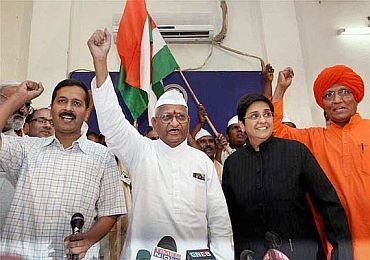
There are alternatives that are preferable to the octopus like Jan Lokpal being proposed. Extremism, whether the Gandhian excess of non-violence or obsession with environment at cost of everything else is dangerous in the long run, says Colonel Anil Athale (retd).
The crusade against corruption has become the biggest generator of rating points for television channels and as the government-sponsored and watered down Lokpal Bill is presented before Parliament, the noise surrounding the issue is likely to increase to deafening levels.
Nobody can accuse the present rulers of being obsessed with 'honesty'. The toothless Lokpal Bill is logical in these circumstances. But that does not mean that the 'extremist' posture of civil society activists of an all encompassing Jan Lokpal is the answer.
The one demand of the civic activists that merits full support is to put the anti-corruption wing of the Central Bureau of Investigation directly under the Lokpal. Unfortunately by increasing the ambit of Lokpal to the judiciary, MPs and the PM, the activists have lost a lot of support.
How do the anti-corruption crusaders expect the very MPs to support a bill that curbs their powers? It is a poor strategy at best and naive at worst.
Please click NEXT to read more...
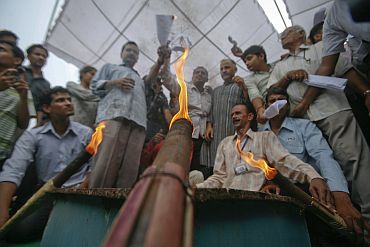
In the 1980s there was a similar upsurge of popular disgust at defections by elected representatives. The upshot was the 'anti-defection bill'.
What that bill has done now is to give party's bosses total control over the MPs when it comes to voting. This has nullified inner party democracy and made our elected representatives virtual slaves to the party bosses.
The parties themselves, with the exception of the Bharatiya Janata Party and the Left parties, are more family dominated 'enterprises' than political parties.
For instance, if it were not for the anti-defection law, many MPs with their ear to ground would be inclined to vote for a strong Lokpal, but cannot due to the threat of disqualification.
Many political scientists agree that the anti-defection bill has made situation worse -- the remedy has been worse than the disease of defection.
As a keen observer and someone who has observed and studied the decision making in the defence ministry, one can see that the kind of all powerful Lokpal is prone to be misused by disgruntled elements. Fear of prosecution on flimsy grounds can make the honest civil servant hesitate to take decisions.
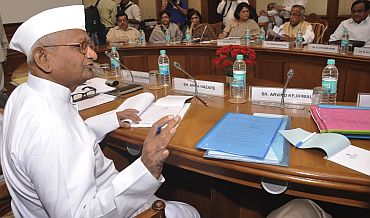
Currently in lynch mob mentality, the media, especially the 24-hour television channels, are in race to 'unearth' scams and scandals. Essentially the Lokpal is meant to question the various decisions by the administrators and policy makers. In any decision making there can be,
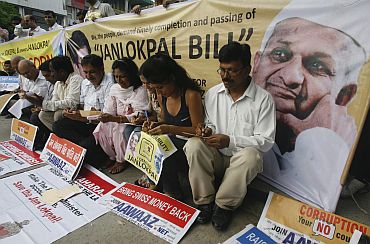
Unfortunately in today's climate where the mass of people are angry due to 'mega' corruption, Anna Hazare and his concept of all powerful and all pervasive Lokpal has caught the fancy of people.
Are we heading to creating another 'monster'?
The greatest fear with this current witch hunt atmosphere is that the notoriously slow decision making process in India will be further accentuated.
After all if one takes no decision one does not make any mistake! Are the supporters of omnipotent Jan Lokpal ready to deal with indecision?
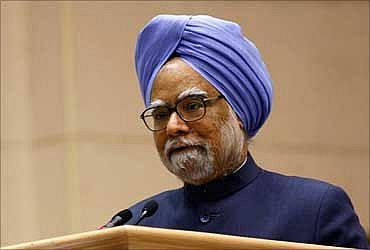
The most crucial issue in the corruption debate ought to be focussed on 'intent' of the decision-maker.
An act should be called 'corrupt' only if it can be proved that the decision was made deliberately to cause wrongful gain to himself or someone else or wrongful loss to some other party.
Unless this touchstone is applied rigorously, there is a danger of Lokpal being used by a disgruntled employee or a contractor who has lost out, to harass an honest executive.
This author is not very clear as to how this is to be implemented and who will check the Lokpal? The perennial problem of who will police the police?
The prime minister as the top executive who has the responsibility to steer the ship of the state must be kept out of the preview of Lokpal, as also the judiciary.
It makes eminent sense to have separate machinery under 'judicial accountability' to deal with judicial corruption. To those who clamour for PM being put under Lokpal, the answer is, leave it to the party and electorate.
After all, the late Rajiv Gandhi paid the price of loss of power due to 'Bofors' deal and associated corruption charges.
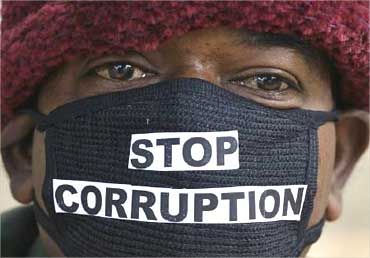
The same rule applies to the corruption by MPs. If in their wisdom people still choose the corrupt in the next elections then there is very little that Lokpal or anyone else can do about it.
This author also disagrees with the argument to bring 'all' government servants under Lokpal or Lokayukta. The burden of flood of minor complaints will lead to the collapse of the system.
The better alternative is to bring higher bureaucracy upto the level of district collector or district magistrate and equivalent to be made accountable to Lokpal. A tree normally rots from the top.
In addition, suitable changes could be made in the civil services conduct rules to make the senior officers accountable for the corruption by their subordinates. But to make this workable, the senior officers concerned must also be given quasi judicial powers to take administrative action to cut salary, deny increment/promotion and even to dismiss the erring employee.
This alternative is preferable to the octopus like Jan Lokpal being proposed since this multi-pronged approach has better chance of success. Extremism, whether the Gandhian excess of non-violence or obsession with environment at cost of everything else, is dangerous in the long run.
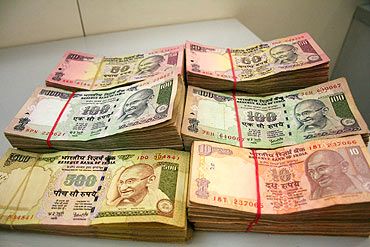
This will give the necessary backbone to the bureaucrat to refuse ministerial orders that are illegal or immoral. By cutting off the 'limbs' of the corruption monster, the corrupt minister can be neutralised.
There will be no need to then bring the political heads specifically under the Lokpal. The essence of democracy is check and balances. Yes, a strong Lokpal is needed but one that adheres to this principle.
The fundamental reason for growth of corruption in India is the social change that has elevated Goddess 'Laxmi' to the apex. Greed is good' is the new social mantra. The Indian hierarchy of values that prized knowledge or dharma (as duty and not religion) at the top has given way to wealth as the top value.
There is no social stigma associated with wealth generated through corruption. The corrupt have become shameless and socially acceptable. This fundamental change in our traditional society is at the root of all pervasive corruption.
This 'materialism' and import from the West necessitates a strong anti-corruption regime and rules. A sensible Lokpal, neither the jan or sarkari variety is the answer.
There is a long way to go for India that still follows laws enacted in 1860s and 1870s!